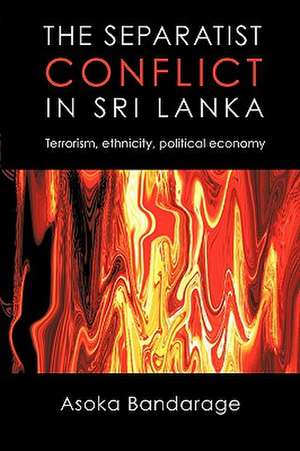The Separatist Conflict in Sri Lanka
Autor Asoka Bandarageen Limba Engleză Paperback
| Toate formatele și edițiile | Preț | Express |
|---|---|---|
| Paperback (1) | 119.37 lei 3-5 săpt. | |
| iUniverse – | 119.37 lei 3-5 săpt. | |
| Hardback (1) | 1227.38 lei 6-8 săpt. | |
| Taylor & Francis – 4 noi 2008 | 1227.38 lei 6-8 săpt. |
Preț: 119.37 lei
Nou
Puncte Express: 179
Preț estimativ în valută:
22.84€ • 23.92$ • 18.95£
22.84€ • 23.92$ • 18.95£
Carte disponibilă
Livrare economică 20 martie-03 aprilie
Preluare comenzi: 021 569.72.76
Specificații
ISBN-13: 9781440155611
ISBN-10: 1440155615
Pagini: 279
Dimensiuni: 152 x 229 x 17 mm
Greutate: 0.44 kg
Editura: iUniverse
ISBN-10: 1440155615
Pagini: 279
Dimensiuni: 152 x 229 x 17 mm
Greutate: 0.44 kg
Editura: iUniverse
Cuprins
Introduction 1. Conceptual Frameworks: Broadening the Discourse 2. Prelude: The British Colonial Period and Early Years of Independence 3. From Class Struggle to Ethnic Separatism, 1971-1977 4. Liberalization, Authoritarianism, and Communal Violence, 1977-1983 5. Internationalization of the Secessionist Struggle, 1983-1987 6. Indian Intervention, Indo-Sri Lanka Accord, and Intensification of Violence, 1987-1994 7. A 'Peace Package', War, and the International Community, 1994-2002 8. Norwegian Facilitated Peace Initiative, 2002-2008 9. Globalization and Conflict Resolution: Separatism or Pluralism?
Notă biografică
Asoka Bandarage is currently Visiting Associate Professor in the Government Department, Georgetown University, US. Her research interests include the global political-economy and ethnicity, gender, population and ecology in the context of South Asia.
Recenzii
"Bandarage's book broadens the discourse on the separatist conflict in Sri Lanka by moving beyond the familiar bipolar Sinhala versus Tamil ethnic antagonism to show how the form and content of ethnicity are shaped by historical social forces. Her multipolar analysis takes into account diverse ethnic groups, intraethnic, social class, caste and other variables at the local, regional and international levels." - Georgetown University, 2008
"Prof. Asoka Bandarage's latest book, The Separatist Conflict in Sri Lanka, Terrorism ethnicity, political economy, comes into this enclosed space like a breath of fresh air, easing the suffocation inside the closed ideological box. [...] It opens up vistas that were never considered valid for analyzing the Sri Lankan conflict. In this respect her book not only breaks new ground but also presents a panoramic view of the conflict."- H. L. D. Mahindapala; The Sri Lankan Guardian, January 2009
"It is an indispensable book for future studies and peace-making in Sri Lanka." - Daily Mirror, Sri Lankan morning daily; January 2009
"This book is a must-read for students, academics, and all others hoping to gain some understanding of the ethnic civil war beyond the 'iron law of ethnicity'." - A.R.M. Imtiyaz, Asia Policy, July 2009
"This is a gripping and valuable account of Sri Lanka’s descent into civil war, the consequences of which are still being played out...an excellent and highly recommended analysis of one of South Asia’s most intractable political and ethnic dilemmas." - Bruce Matthews, Pacific Affairs: Volume 83, No. 1 – March 2010
"Contrary to conventional wisdom, Bandarage argues that the conflict in Sri Lanka is not an 'ethnic' conflict at all, but actually is the outcome of economic contention and global pressures. To this end, Bandarage expands the focus of the conflict from a singular domestic perspective and adds both the regional and international contexts to her analysis." - Simanti Lahiri, The Journal of Asian Studies: Volume 69, No. 2 – May 2010
"Prof. Asoka Bandarage's latest book, The Separatist Conflict in Sri Lanka, Terrorism ethnicity, political economy, comes into this enclosed space like a breath of fresh air, easing the suffocation inside the closed ideological box. [...] It opens up vistas that were never considered valid for analyzing the Sri Lankan conflict. In this respect her book not only breaks new ground but also presents a panoramic view of the conflict."- H. L. D. Mahindapala; The Sri Lankan Guardian, January 2009
"It is an indispensable book for future studies and peace-making in Sri Lanka." - Daily Mirror, Sri Lankan morning daily; January 2009
"This book is a must-read for students, academics, and all others hoping to gain some understanding of the ethnic civil war beyond the 'iron law of ethnicity'." - A.R.M. Imtiyaz, Asia Policy, July 2009
"This is a gripping and valuable account of Sri Lanka’s descent into civil war, the consequences of which are still being played out...an excellent and highly recommended analysis of one of South Asia’s most intractable political and ethnic dilemmas." - Bruce Matthews, Pacific Affairs: Volume 83, No. 1 – March 2010
"Contrary to conventional wisdom, Bandarage argues that the conflict in Sri Lanka is not an 'ethnic' conflict at all, but actually is the outcome of economic contention and global pressures. To this end, Bandarage expands the focus of the conflict from a singular domestic perspective and adds both the regional and international contexts to her analysis." - Simanti Lahiri, The Journal of Asian Studies: Volume 69, No. 2 – May 2010
Descriere
Descriere de la o altă ediție sau format:
This book provides an in-depth, historical case study of the origin, evolution and potential resolution of the civil conflict in Sri Lanka.
This book provides an in-depth, historical case study of the origin, evolution and potential resolution of the civil conflict in Sri Lanka.
